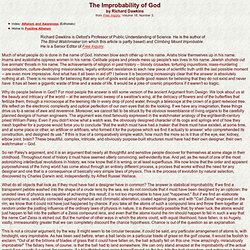

I Love GOD - Sacred texts (holy books) of various world religions.
Atheist Blogging. Christianity. Jesus and Hell : Interfaith. Benevolent God did not create Hell.

There is no Hell in a literal sense, at least not as a physical place of dwelling full of fire and brimstone and torture – as the lasting mediaeval imagery would have us believe. Hell requires a closer scrutiny of the garbled Greek influences riding upon Jewish philosophy to determine its inferred meaning. Sheol is the word used throughout the Old Testament that is usually translated as “Hell”, but the word itself relates simply to death and the grave – or perhaps more precisely, a grave-pit – that’s where the notion of Hell being “beneath” – a form of underworld – comes from – bodies are buried beneath us within the earth, and conjoined with the primal notion of Heaven and God being literally among or above “the heavens”. Yet even death is not seen as separation from YHWH: cf Job 11:8, 26:6, Jonah 2:2. However, Sheol, like the word “Hell” itself, can be used figuratively. In the New Testament, however, the emphasis begins to broaden.
Does Hell Exist. You are here: Worldviews >> Does Hell Exist Does Hell Exist - What does the Old Testament say?

Does Hell exist? A proper biblical worldview includes a belief in a real, eternal, and physical hell. What do you believe? It is very interesting to discover that there are more Bible verses about Hell than there are about Heaven. Does Hell Exist - What does the New Testament say? Does Hell Exist - What did Jesus say? Does Hell Exist - How is an eternity in Hell fair? A. J. Ayer "Language Truth Logic and God," 1946. Language, Truth, Logic, and God The following excerpt was published in Language Truth and Logic (1946). by A.

J. Ayer he criterion which we use to test the genuineness of apparent statements of fact is the criterion of verifiability. The sentence expressing it may be emotionally significant to him; but it is not literally significant. A simple and familiar example of such a proposition is the proposition that there are mountains on the farther side of the moon. It should now be clear that the only information which we can legitimately derive from the study of our aesthetic and moral experiences is information about our own mental and physical make-up. This mention of God brings us to the question of the possibility of religious knowledge. What is not so generally recognised is that there can be no way of proving that the existence of a god, such as the God of Chrisianity, is even probable.
Thus we offer the theist the same comfort as we gave to the moralist. The Improbability of God. The Improbability of God by Richard Dawkins from Free Inquiry, Volume 18, Number 3.

Much of what people do is done in the name of God. Irishmen blow each other up in his name. Arabs blow themselves up in his name. Imams and ayatollahs oppress women in his name. Celibate popes and priests mess up people's sex lives in his name. Why do people believe in God? So ran Paley's argument, and it is an argument that nearly all thoughtful and sensitive people discover for themselves at some stage in their childhood. What do all objects that look as if they must have had a designer have in common?
This is not a circular argument, by the way. Of all the trillions of different ways of putting together the atoms of a telescope, only a minority would actually work in some useful way. We can safely conclude that living bodies are billions of times too complicated -- too statistically improbable -- to have come into being by sheer chance. Eyes and wings cannot spring into existence in a single step.
Current Events.